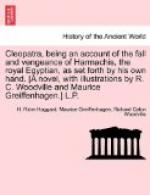Then, being very weary, I went to rest, but could sleep little for the strangeness of the place, the noises in the streets, and the thought of the morrow. While it was yet dark, I rose, climbed the stair to the roof of the house, and waited. Presently, the sun’s rays shot out like arrows, and lit upon the white wonder of the marble Pharos, whose light instantly sank and died, as though, indeed, the sun had killed it. Now the rays fell upon the palaces of the Lochias where Cleopatra lay, and lit them up till they flamed like a jewel set on the dark, cool bosom of the sea. Away the light flew, kissing the Soma’s sacred dome, beneath which Alexander sleeps, touching the high tops of a thousand palaces and temples; past the porticoes of the great museum that loomed near at hand, striking the lofty Shrine, where, carved of ivory, is the image of the false God Serapis, and at last seeming to lose itself in the vast and gloomy Necropolis. Then, as the dawn gathered into day, the flood of brightness, overbrimming the bowl of night, flowed into the lower lands and streets, and showed Alexandria red in the sunrise as the mantle of a king, and shaped as a mantle. The Etesian wind came up from the north, and swept away the vapour from the harbours, so that I saw their blue waters rocking a thousand ships. I saw, too, that mighty mole the Heptastadium; I saw the hundreds of streets, the countless houses, the innumerable wealth and splendour of Alexandria set like a queen between lake Mareotis and the ocean, and dominating both, and I was filled with wonder. This, then, was one city in my heritage of lands and cities! Well, it was worth the grasping. And having looked my full and fed my heart, as it were, with the sight of splendour, I communed with the Holy Isis and came down from the roof.
In the chamber beneath was my uncle Sepa. I told him that I had been watching the sun rise over the city of Alexandria.
“So!” he said, looking at me from beneath his shaggy eyebrows; “and what thinkest thou of Alexandria?”
“I think it is like some city of the Gods,” I answered.
“Ay!” he replied fiercely, “a city of the infernal Gods—a sink of corruption, a bubbling well of iniquity, a home of false faith springing from false hearts. I would that not one stone of it was left upon another stone, and that its wealth lay deep beneath yonder waters! I would that the gulls were screaming across its site, and that the wind, untainted by a Grecian breath, swept through its ruins from the ocean to Mareotis! O royal Harmachis, let not the luxury and beauty of Alexandria poison thy sense; for in their deadly air, Faith perishes, and Religion cannot spread her heavenly wings. When the hour comes for thee to rule, Harmachis, cast down this accursed city and, as thy fathers did, set up thy throne in the white walls of Memphis. For I tell thee that, for Egypt, Alexandria is but a splendid gate of ruin, and, while it endures, all nations of the earth shall march through it, to the plunder of the land, and all false Faiths shall nestle in it and breed the overthrow of Egypt’s Gods.”




